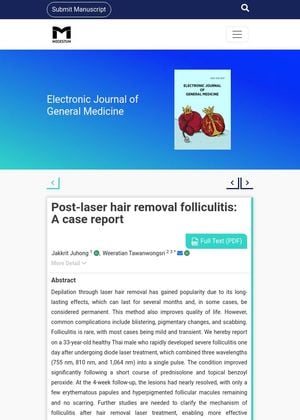🚨 The text is moderately relevant as it discusses a condition related to hair removal and its effects on the scalp, which can be linked to scalp health and wound healing, but it does not directly address hair loss or alopecia.
TLDR Laser hair removal can cause severe skin irritation, but it can improve with treatment.
A 33-year-old healthy Thai male developed severe folliculitis one day after diode laser hair removal treatment, which used a combination of three wavelengths (755 nm, 810 nm, and 1,064 nm). The condition improved significantly with a short course of prednisolone and topical benzoyl peroxide. At the 4-week follow-up, the lesions had nearly resolved, with only a few erythematous papules and hyperpigmented follicular macules remaining and no scarring. Further studies are needed to understand the mechanism of folliculitis post-laser hair removal for better prevention and management.
21 citations
,
April 2019 in “Journal of cosmetic and laser therapy” Laser hair removal is popular for long-term hair reduction but carries risks, requiring well-trained operators and better regulations, especially in South Africa.
 21 citations
,
April 2019 in “Clinical, cosmetic and investigational dermatology”
21 citations
,
April 2019 in “Clinical, cosmetic and investigational dermatology” The document concludes that stopping shaving or removing affected hair can alleviate Pseudofolliculitis barbae (PFB).
143 citations
,
January 2013 in “Dermatologic surgery” In-office laser hair removal works well long-term, especially Nd:YAG for darker skin, but home devices need more testing.
 207 citations
,
January 2011 in “Dermatologic Therapy”
207 citations
,
January 2011 in “Dermatologic Therapy” Laser hair removal is the most requested cosmetic procedure and has become a scientifically-based treatment suitable for all skin types.
 19 citations
,
January 2007 in “Dermatology”
19 citations
,
January 2007 in “Dermatology” Unwanted facial hair significantly impacts over 40% of women's psychological and social well-being, and various treatment options are available.
 64 citations
,
January 2004 in “American journal of clinical dermatology”
64 citations
,
January 2004 in “American journal of clinical dermatology” Folliculitis is an inflammation of hair follicles that requires proper diagnosis and treatment based on the specific cause.
 22 citations
,
July 2003 in “Military medicine”
22 citations
,
July 2003 in “Military medicine” New treatments are available for managing ingrown hair inflammation.
 30 citations
,
May 2014 in “American Journal of Clinical Dermatology”
30 citations
,
May 2014 in “American Journal of Clinical Dermatology” The conclusion is that better understanding and more research are needed to effectively manage follicular and scarring disorders in skin of color, with an emphasis on patient education and cultural awareness.
 January 2019 in “ARC journal of pharmaceutical sciences”
January 2019 in “ARC journal of pharmaceutical sciences” Acne can be managed with various treatments and requires psychological support due to its emotional impact.
 18 citations
,
June 2019 in “Clinical research in dermatology”
18 citations
,
June 2019 in “Clinical research in dermatology” Acne can't be cured but can be managed with treatments like benzoyl peroxide and diet changes; it's costly and can lead to scarring and mental health issues.
 19 citations
,
May 2007 in “Dermatologic therapy”
19 citations
,
May 2007 in “Dermatologic therapy” The document concludes that various treatments, including laser therapy, are effective for managing pseudofolliculitis barbae, especially in darker skin types.
1 citations
,
May 2017 in “InTech eBooks” The chapter explains common scalp conditions, including infections, infestations, and tumors.










